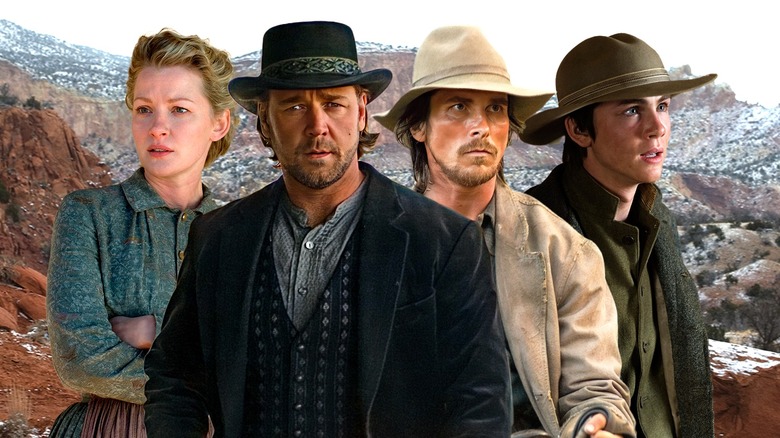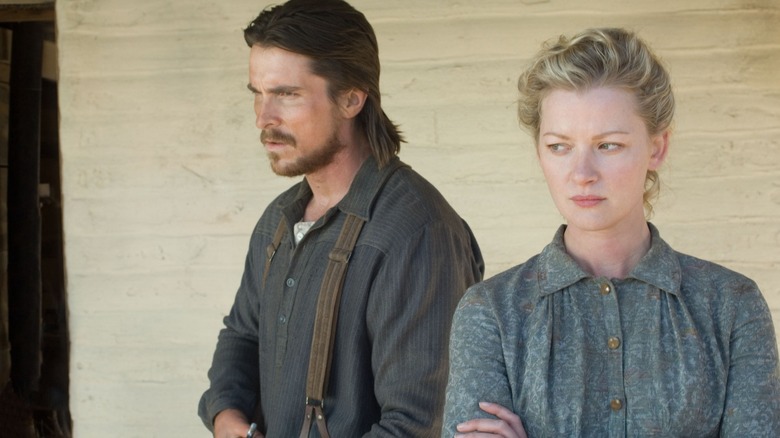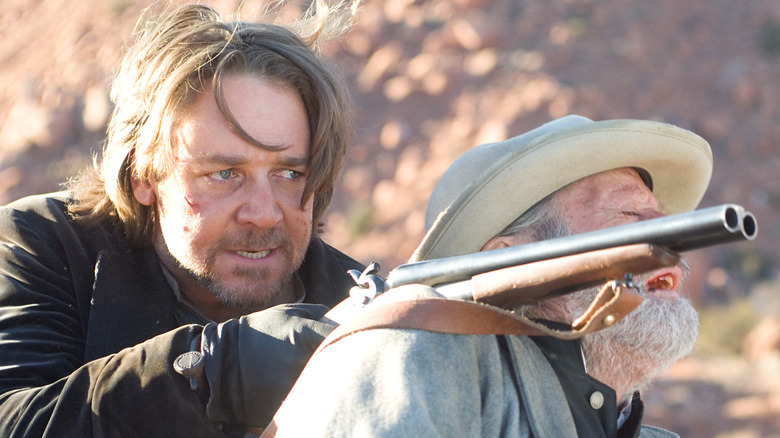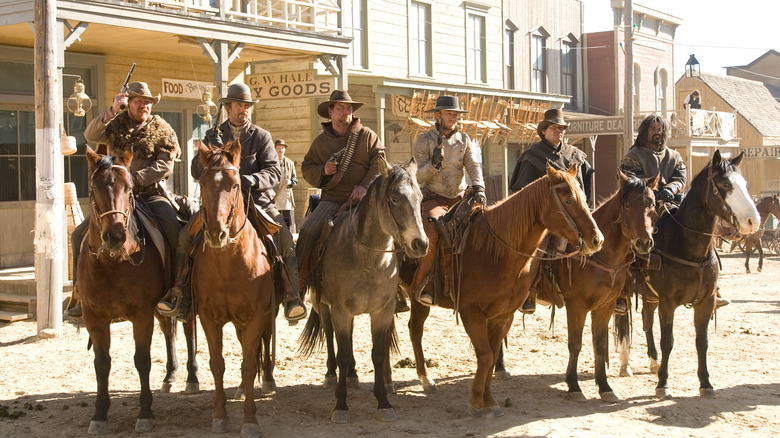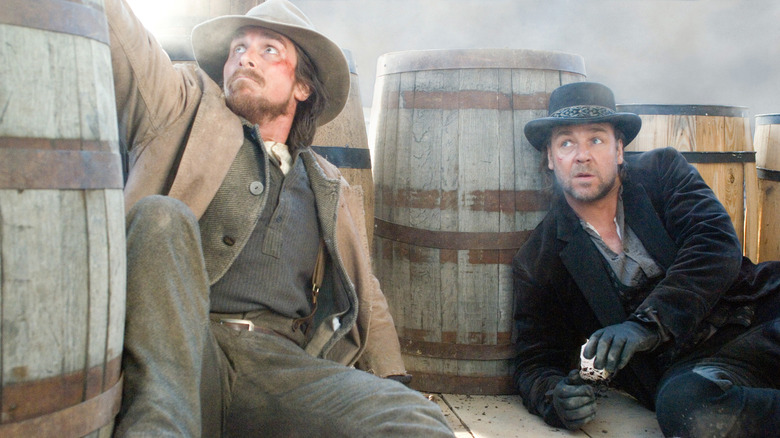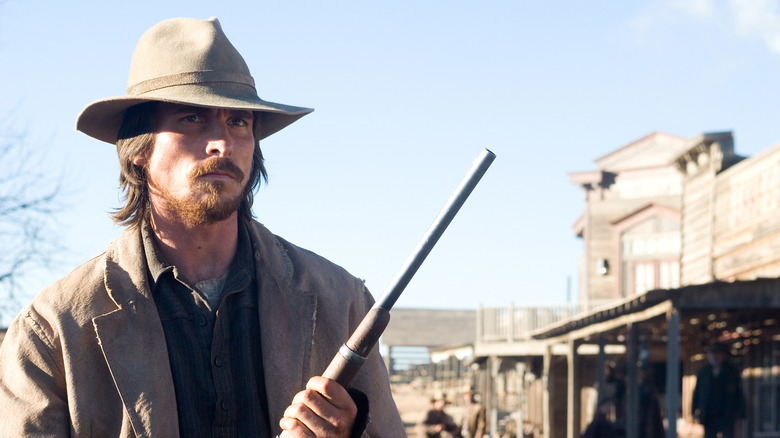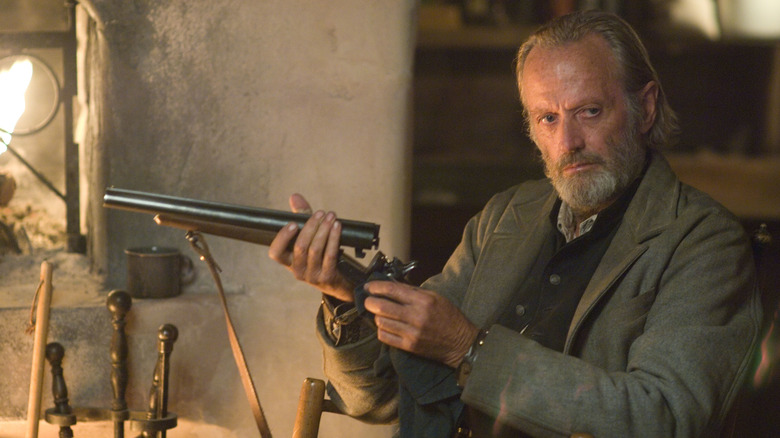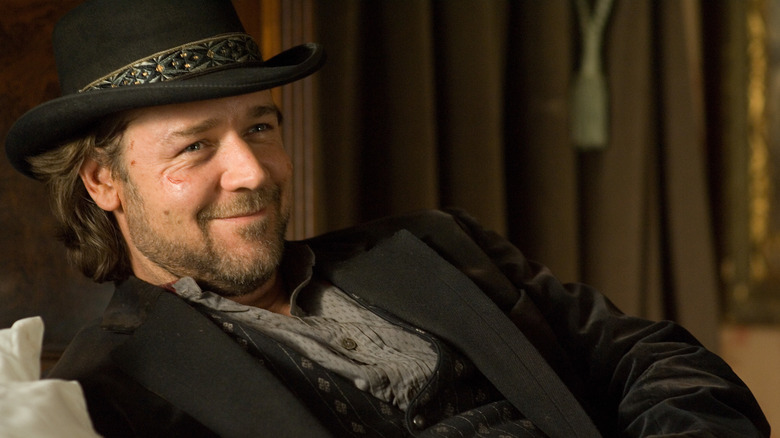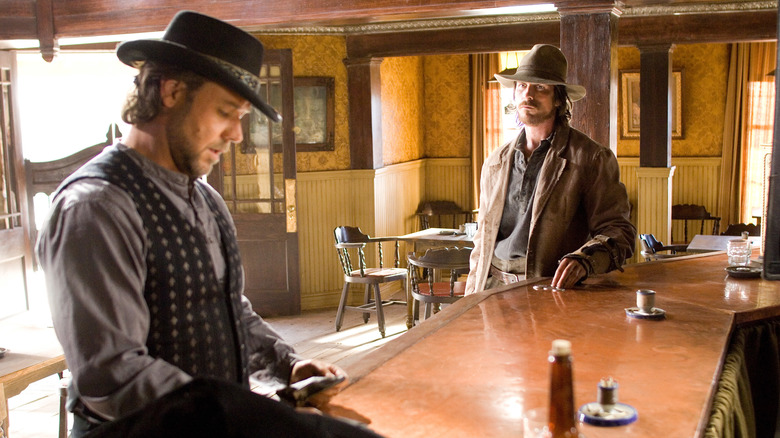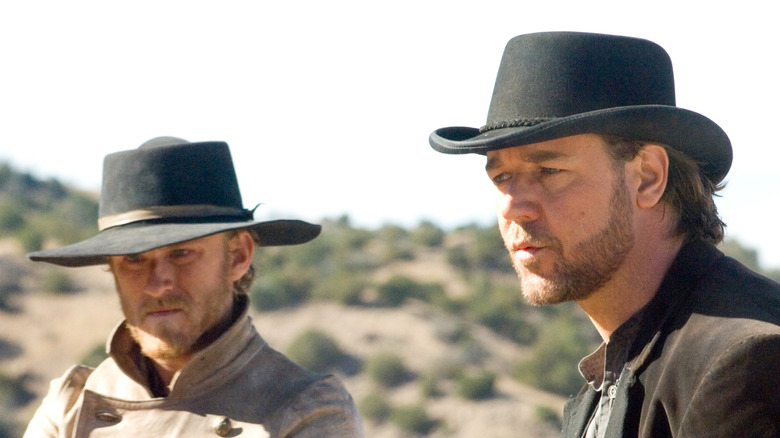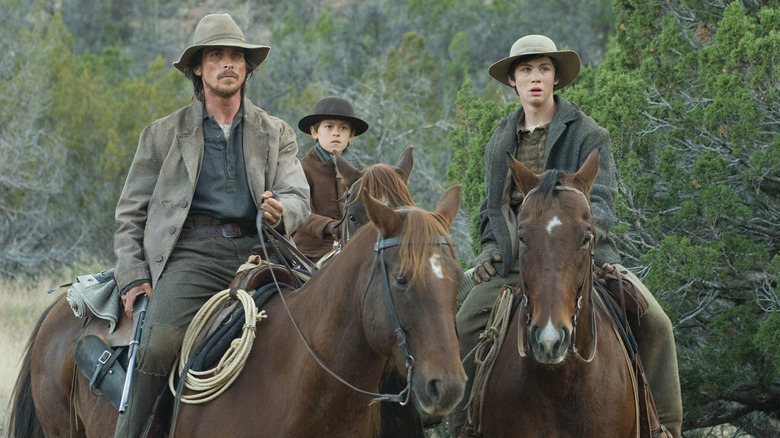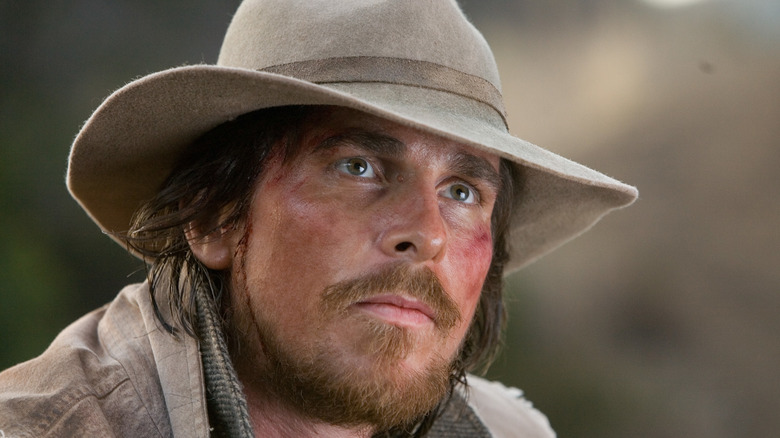3:10 To Yuma Facts That Always Catch The Train On Time
Missing the train has always been a powerful metaphor for missed opportunity, abandoned love, and the inexorable hand of fate. In director James Mangold's "3:10 to Yuma," struggling rancher Dan Evans' (Christian Bale) mission to get outlaw Ben Wade (Russell Crowe) to the station before the 3:10 afternoon train to Yuma Territorial Prison departs takes on mythological proportions. Catching the iron horse before it sounds its horn and disappears under a head of its own steam is not about practicality, convenience, or being punctual for an important meeting. It's about standing fast, doing the right thing, staying true to your principles, and remaining staunch when the yellowbellies scatter and run for the hills. In essence "3:10 to Yuma" is about two uncompromising men from different sides of the tracks who find a shared middle ground in notions of courage, purpose, and a determination to back their every word with a gut full of action.
Released in 2007, "3:10 to Yuma" reminded audiences everywhere just how great the Western genre could be when it had its hat on, walking tall and firing on all cylinders. Bale and Crowe hit the bullseye every time with their nuanced performances, and proved there were no real heroes or villains in the Old West — just battered and bruised souls just trying to carve some sort of life for themselves in a new frontier of someone else's making. Here's some rootin', tootin', hellraisin' facts about "3:10 to Yuma."
The director was determined not to do a cynical Hollywood remake
Exactly half a century before James Mangold rounded up Christian Bale, Russell Crowe, and Peter Fonda for a new classic Western, audiences had already been mesmerized by the antics of Dan Evans and Ben Wade in Delmer Daves' original film version, itself an adaptation of Elmore Leonard's short story. Released in 1957, the film captivated viewers for years, including a young Mangold, who revealed in his "3:10 to Yuma" commentary that the original film had a massive impact on him when he first saw it as a 17-year-old.
Mangold points out that remakes are often a cynical way of guaranteeing a degree of box office success. However, he explained to ComingSoon.net that because the original "3:10 to Yuma" was relatively unknown to modern audiences, it was a far cry from the sort of hollow Hollywood remake people are used to. "There's this very cynical kind of remake in Hollywood where you have a brand of a toy or a TV show from the '70s or whatever it is," the filmmaker said, "and you take some modern stars and 70 million dollars and you throw it all together and you have asses in seats because everyone recognizes the brand." The lack of that sort of brand recognition was exactly what attracted Mangold to the project.
James Mangold was keen to avoid Western stereotypes
There's a time-honored cowboy cliché that the bad guy wears a black hat and the good guy wears white. Yet in reality, the straight-shooting, hard-drinking West was a world still finding its feet, where lines between right and wrong often became blurred. Mangold pointed out to ComingSoon.net that there's often a misconception that Westerns are simply good-vs.-evil movies when in fact, some of the greats in the genre such as "Shane," "Rio Grande" and "The Searchers," defy that easy moralizing. "These are all movies between good and bad," he explained, adding that he believed the genre fell out of popularity because of this misconception about their simplicity. The best Westerns, he reasoned, have more in common with the gritty moral conflict of something like Scorsese's "Taxi Driver."
Because "3:10 to Yuma" features no archetypal heroes or villains but simply an array of complex characters and good people committing bad deeds to survive. "I don't think it's particularly obtuse to explore a lot of issues today in the context of the post Civil War period in America and allow you to see them allegorically instead of directly," he said. "And it makes the film less preachy."
The members of Ben Wade's gang all had to be extremely proficient riders
Ben Wade is a poker-faced, cold-blooded, trigger-happy kind of outlaw who will turn like a rattlesnake on a dime. Thanks to Russell Crowe's performance, he's also kind of charismatic and has a way with one-liners and a winning smile. A gritty air of authenticity surrounds Wade's every word and deed, and if you want to be in his gang, you'd better be tough and have the scars to prove it. Having the ability to ride a horse like the hounds of hell were on your tail also helps. In his commentary of "3:10 to Yuma," James Mangold explained that he insisted that any actor auditioning to ride with Wade's crew had to be particularly skilled on horseback.
In an interview with Oregon Live, Mangold explained, "There's no one experienced in making Westerns anymore, besides Clint Eastwood and Kevin Costner. So the only thing you can do is have good people around you and learn. I was fortunate that Russell and Christian and Peter Fonda were good riders and good gunmen. They really knew that stuff."
Mangold didn't believe modern viewers would buy the story's original ending
In the original version of "3:10 to Yuma," Dan Evans survives and it's he who shoots Charlie Prince dead, not Ben Wade, and the story ends with the two of them both riding the train to Yuma together. Yet James Mangold harbored reservations as to whether modern audiences would buy into an ending where both lead characters survive and the rest of Wade's gang stop their pursuit of their leader simply because Evans shoots Prince. In his director's commentary, Mangold explained. that although he gave the 1957 film's screenwriter, Halsted Welles, did a fantastic job adapting Leonard's story, an updated ending was called for. "I didn't buy it and didn't think that audiences would buy it," the director said.
Mangold revealed that he wanted an ending that had "more of a biblical quality." By being the man who puts Wade on the train when all others had turned their back and fled, Evans is transformed in the eyes of his son. And by shooting his gang and allowing himself to be sent to Yuma, albeit before he makes his escape, Wade appears to acknowledge that Evans was always the better man and the father figure he wished he could have had.
Mangold believes the Western is the landscape of our Shakespearean texts
The Old West symbolizes the birth pangs of a nation, and is often viewed as a twilight world where civilization and the primal urges of man would lock horns with one another for dominance. It's a perfect setting for a movie but as James Mangold pointed out in an interview with Oregon Live, when a director tackles a Western it changes their modus operandi, saying, "Something happens to a director when he makes a Western; he begins basing a movie on other movies and quoting other movies." He added that people are obsessed with the "iconography of the West" and believe that historical accuracy should play second fiddle to the themes of the Western.
Speaking to Rotten Tomatoes, Mangold insisted that the audience should view the Western in a metaphorical and not historical sense. "The Western is our castle in Denmark; it's the landscape of our Shakespearean texts," he explained. "We don't have stories of royalty ... our history is explained with violence and blood on a prairie between impoverished and wealthy men in a brand new land."
Peter Fonda was initially considered too laconic for the role of McElroy
In "3:10 to Yuma" Pinkerton lawman Byron McElroy is just as grizzly and bloodthirsty as Ben Wade. The only difference is he wears a badge and has the full weight of the establishment behind him. He carries the aura of a poacher-turned-gamekeeper, and he's just as mean and defiant as any jerky-chomping, whiskey-guzzling outlaw. It takes a certain level of intensity and venom to pull off a role like McElroy, and Peter Fonda was initially considered too laconic to carry it off.
In an interview with the State Journal-Register, the man famous for being an "Easy Rider" explained, "Jim Mangold didn't think that I was right for the part because the way I play things is a little laconic. He didn't know if I had enough energy for the role. So I met him and showed him I had a lot of energy." Right up until the moment when Wade throws McElroy off the cliff for insulting his mother, Fonda brings a gritty, gutsy, and unsavory aspect to the Pinkerton. His performance makes him hard to like but impossible to take your eyes off. The character of McElroy wasn't in the '57 film, but the remake is all the richer for having him onboard, in what was Fonda's 70th motion picture.
Russell Crowe relished playing Ben Wade
Ben Wade is as dangerous and unpredictable as a barrel of rattlesnakes and mean enough to make medicine sick, with the sort of charisma that would make the devil drop his guard during a high-stakes poker game. He's the darkness on the edge of town, the thief who would steal fire from the sun, the laughter in the gallows, and the pied piper who men will follow blindly into madness and death. In short, he's the sort of character actors just love to play, and Russell Crowe was no exception.
In an interview with Entertainment shortly after the film's release, the actor posited that people were responding to the film well because "Mangold knows how to push an audience's button." Discussing the character of Wade, Crowe said, "Playing bad guys, man, that's just fun. Pretty much every time you're in a movie the bad guy gets to do all the fun stuff. It was just enjoyable from that point of view."
Christian Bale believes the film's power comes from the uncompromising nature of the lead characters
Ben Wade and Dan Evans begin "3:10 to Yuma" as polar opposites. One is a lone wolf who lives outside of the law and is governed by the roll of the dice, the speed of a draw, and the luck of the devil. The other is a farmer and family man, trying to make ends meet within a system that gives him no quarter and little respect. In one another they find something each of them lacks. As Christian Bale explained in an interview with ScreenSlam, what really draws them together and gives the film its power is the uncompromising and principled streak that governs them both. "That is the whole heart of the movie ... neither of them compromises and both tell the truth. And that's something which is very rare in this world."
In an interview with Ain't It Cool News, James Mangold stressed that the dynamic worked because of Crowe and Bale's screen presence. "They're obviously modern men, but they also bring a kind of old world physicality and masculinity to the screen that is really rewarding to see," the director explained. He added that it's never crystal clear who the good and bad guy is in their relationship. "Clearly, Russell is a felon and a murderer and clearly, Christian's character is a family man, but in the mechanics of how stories work, I think you could argue this is almost a buddy picture by the time it ends and that they're really allied together in a common purpose."
Tom Cruise almost played Ben Wade
Apart from Vincent in "Collateral" and the campest nightcrawler ever to suck blood on the big screen in "Interview with the Vampire," Tom Cruise doesn't tend to play bad guys. His trademark million-dollar grin, wholesome aura, and boy-next-door charm don't lend themselves well to villains who have a habit of playing hard and fast with morality. You wouldn't expect to hear him deliver lines like, "It's in man's nature to take what he wants. That's how we're born." But before the cameras rolled on Russell Crowe as Ben Wade, Cruise was in the running to play the outlaw with ice in his veins and steel in his eyes.
As James Mangold told Ain't It Cool News, "The person I wanted first for this movie beyond all others was Russell Crowe for Ben Wade." But despite that determination, complications arose when Crowe became attached to Baz Luhrmann's "Australia." When it seemed he wouldn't get his first choice, the director explored other options, including Tom Cruise. Cruise was apparently interested, but when Crowe jumped ship on "Australia" Mangold's main man was back in the frame and it was all systems go.
A horse was killed during filming
As Russell Crowe exclaimed in an interview with Entertainment, "Any movie that starts with a horse being blown up by dynamite, you know there's going to be some fun things to see." Obviously, the horse wasn't really blown up, but merely made to look so by some clever CGI. Sadly, though, a real horse was also killed during the filming of "3:10 to Yuma." According to the American Humane Association, the tragedy occurred during rehearsals for the scene in which 11 horses are ridden at a pace toward the camera as if charging into the audience. The last horse and rider accidentally collided with the camera car and the horse suffered injuries severe enough that a veterinarian decided euthanasia was the humane option.
The American Humane Association decided the accident was probably a result of the horse instinctively following another horse without realizing the danger presented by the camera car. After a thorough investigation with the full cooperation of the production, the AHA determined no wrongdoing. Their statement concludied, "In this incident, neither the filmmakers nor the animal trainers failed to comply with American Humane's guidelines for the safe use of animals in filmed media."
All the major studios passed on 3:10 to Yuma
Although both a critical and box office success, getting the green light for "3:10 to Yuma" and herding it past the finish line was a big ask at a time when Hollywood considered the Western dead as a doornail. Despite James Mangold's reputation as a director and his success with the Johnny Cash biopic "Walk the Line," the project was regarded untouchable by the moneymen at the studios, even with big names like Russell Crowe and Christian Bale on board. In the movie's commentary, Mangold explained that it was a sound indication of how low the Western had fallen as a business proposition.
Sony was originally planning to invest in the picture but when they bailed, Mangold secured his own financing from a bank loan, with Lionsgate eventually picking it up for distribution. As the director explained to Ain't It Cool News, "We got passed on by every studio. I mean think about this, you make 'Walk the Line,' you have a very successful film that makes a lot of money for everyone involved and we go out with our next project which is, by any standard, a very commercial storyline with action and drama and great actors, and nobody wants to make it."
